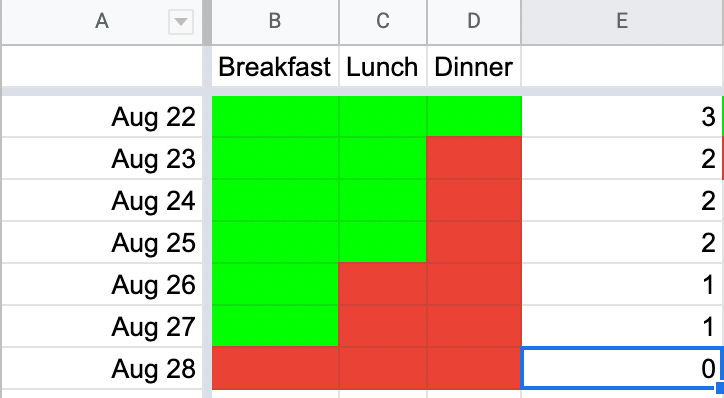A battle of extremes
An extreme diet for a few weeks. Counting calories. Going off sugar for a month. All solid techniques to lose weight and get your reset going. While the idiocy of some diets is scary, as none of these is long-term interventions you can stick to, you will be fine for the most part. You will get a boost of results which you can build on.
The issue is most of you (and this was definitely true for me) are unable to figure out what maintenance means after that. We slip away into our old routine. It starts off with "Let me get some ice cream tonight" to "One drink with the buddies" and in a few days, you are back to your old habits.
Does maintenance mean one slice of cake a week? Or three? What if you are on vacation? Is this what adult life is about - rationing treats?
The issue of being at the two extremes and confused about the middle is a real one. Any solution is going to come from you figuring out what works for you in your context.

Weight loss is never the problem. You being gung-ho for a few weeks will kick things off. Keeping the weight you lost is a much harder nut to crack. Losing weight consistently is another hard problem.
I have a tool in mind for you. Remember, this tool will work for you but that doesn't mean you disregard other tools like "No sugar for a month". Learning to figure out when to use what tool is on you. I'll help, of course.
What's the issue?
For most of us, when we are in the "No" zone, things are clear. You have made your decision on all the eating. Are you gonna eat ice cream tonight - nope? Are you gonna eat some cake - nope. With clarity and reduced decision fatigue, you can move on to a clearer head. But with the end of the diet, with the strain of a few weeks, we veer into the grey.

And when we are in the grey, where exactly are we? That's the issue.
That's what my tool will help you address.
Find your 'delta'
Your current eating, if we were to score it, might be a 50. Or it might be 90. Or a 10.
For a few weeks, you make it a 100! Nuts. But the bigger the difference, the delta, the harder it is to make it sustainable.
If instead, we could arrive at a significant but not crazy delta, you will figure out what's sustainable for you and maintain your weight. Or in all probability, keep losing weight.
Start by scoring
To figure out where to go, you start by seeing where you are.
Let's say you are a "3 meals a day" person. You score each meal as a zero or a one.
What's a zero?
- if you ate anything fried, that's a zero.
- if you ate anything sweet, that's a zero.
- if you ate anything that came in a box (cereal, for example), that's a zero.
- Else, it is a one. Simple!
First, we take stock of where you are today. Starting tomorrow, you score yourself for the next 7 days. This system works best if you don't change anything up for this week. Keep your behaviour as it has been, and see what the score is at the end of the week.

In the above example, I had a great start to the week on Monday. And I am doing pretty well except at dinner. And by Friday, even lunch is getting off hand.
But that's fine. You learn two things immediately - your pattern. For me, dinner is the meal to focus on. Or of course, I could instead say let me get my breakfast and lunch sorted on all 7 days. There's no "wrong" way to go about this.
The second thing I learn is my overall score. That's 11 (total up the green blocks.)
Out of 21 i.e. 7 days x 3 meals per day = a max possible score of 21.
My goal for the next week is to get to 13 (a delta of 2.) I could do this by ensuring my breakfast on Sunday is better, and by figuring out one better dinner option over the 6 days. And keeping everything else as is.
And that's it!
Summing it up
The idea is to not go from 11 to 21 for 4 weeks and then come crashing back down to 11. This is what most of you do. And so, you end up putting back all the weight you lost.
My focus is more long-term. I want you to start thinking months and years, rather than weeks. To do that, you figure out your current score. And while you might still use the tools of "4 weeks of no sugar" and so on, you will come back to this tool to transition back to reality. And instead of going to an arbitrary number, you will always come back to your baseline, or preferably your baseline + a delta.
For example, let's say your score is 11. For the next 3 weeks, you keep it at a 13. And then for whatever reason, you decide to follow the paleo diet for 4 weeks. Great, whatever.
Now, once that diet ends, you get back to this tool and you aim to keep your score at 15.
There's nothing magical about 15. 14 might work as well too. But what won't work is too high a number i.e. 19.
Over the long term, you will find that your baseline has changed. From 11 in Aug 2022, you will find yourself at 17 in Aug 2023 and 19 in Aug 2024. While that might sound ridiculous, keep this simple fact in mind - you want to stay healthy for a long time, a number you think in years and decades. And the only way to do that is to have more sensible habits than not.
To close it out
You can download it here.
Remember, this is a tool. "No sugar for a month" is a tool. Use the tool that's appropriate for you at the right time. For the long-term, frameworks work better than tools - you should check out Daily9 for that. Full disclosure: I am one of the principals behind the D9 and it is what I use for figuring out what my 85% is.
